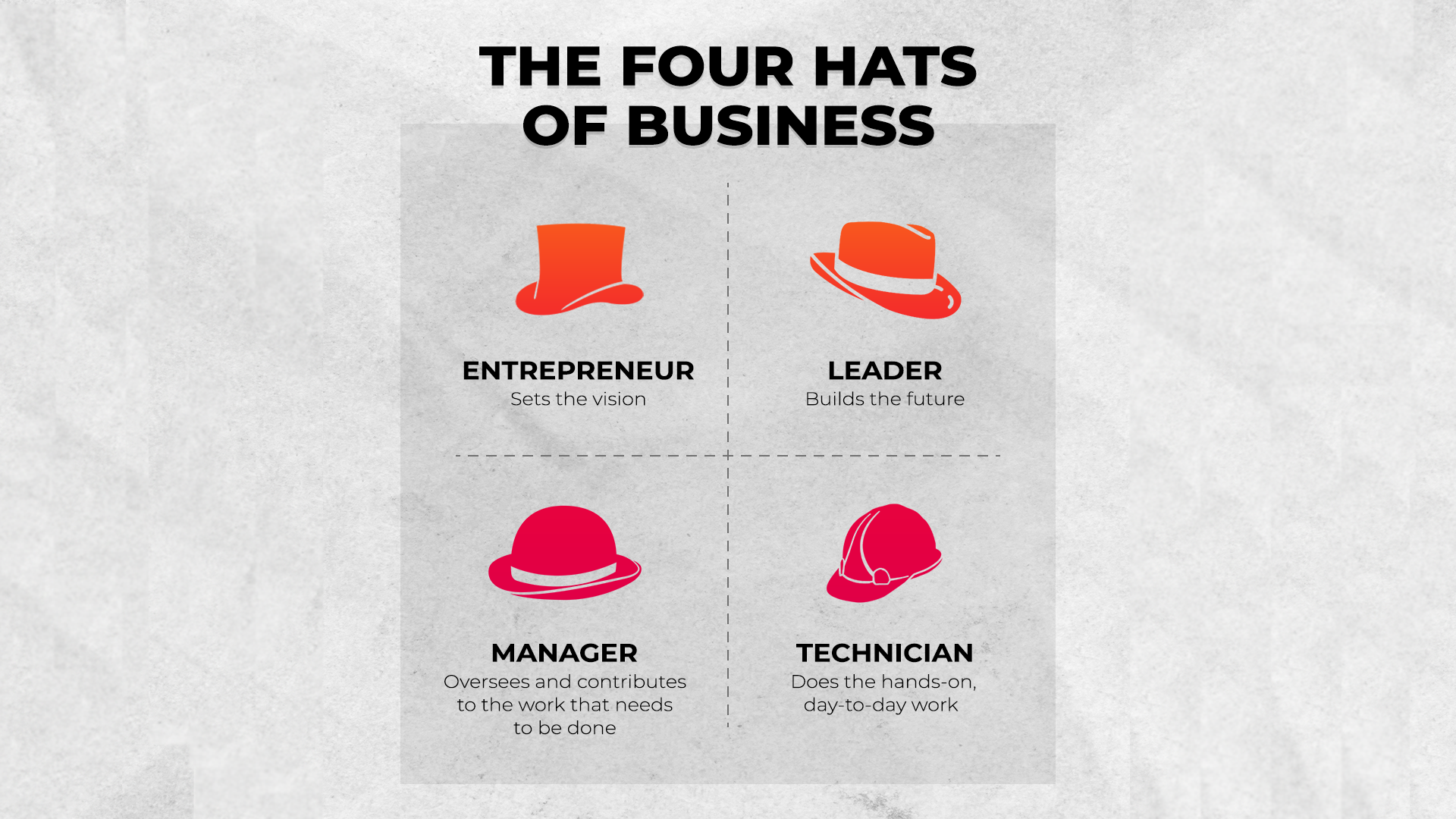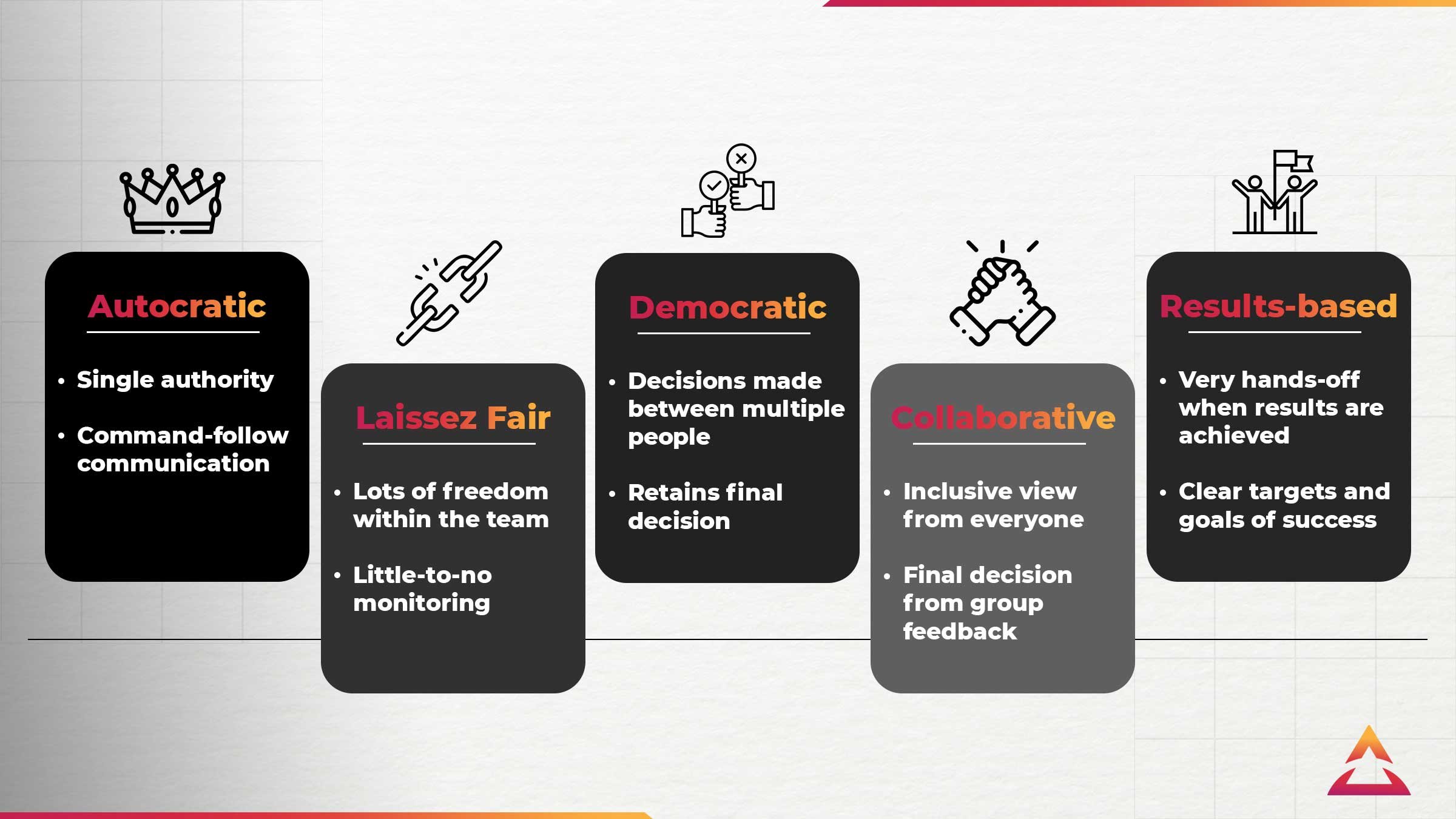Is there one best style of Management?
Every workplace has management. An every workplace has different management styles. Even a sole trader has to manage themselves, their time, and output. There are different styles of management and different kinds of people in managerial positions, but certain styles of management don’t always work.
What are the different styles of management? Is there one bets style of management? What kind of manager are you? Which style would best suit whichever work situation you and your team may find yourself in?
This article will look at the different styles of management, the pros and cons of each, and how you can work out what works best for you.
Leadership vs. management
Before we dive in, it's important to note the difference between leadership and management.
As an entrepreneur, throughout your business journey, you will end up wearing 4 hats at any one time — that of the Technician, Manager, Leader, and Entrepreneur. And your goal as an entrepreneur is to move up each hat to eventually mainly be wearing the hat of the Entrepreneur which is where your business can run and continue to grow without you having to be operationally involved.

And while you may not wear the hat of the manager forever, you will need to wear it at one point during your business' growth journey. You'll also have to recognise who good management looks like, because without managers, you can't scale up and out of the day-to-day of your business.
So, what's the difference?
"Management is head, leadership is heart." — Jack Delosa
Put simply, management is about KPI's, accountability, check-ins, project development and management, and performance management. Leadership is asking, to what degree do we have a vision in this organisation that people are intrinsically motivated to perform?
Management manages the people with their hands on the tools while also contributing to that work sometimes too, while leaders are overlooking the bigger picture.
Our fearless Founder, Jack Delosa, talks more about the differences between the four hats every entrepreneur wears here.
Why is it important to understand all the different management styles?
Knowing how to motivate, lead and teach a team through understanding all the different management styles can help you, as a manager, work more effectively with your team, and elevate yourself further out of the day-to-day. When you understand how to best manage each team, or even individuals, depending on what they or the situation demands, your team will benefit from it and be able to work to their best potential too.
It’s often best to be consistent, define a style and stick to it when you've determined which style suits which team or individual, rather than reacting emotionally to different situations. Reacting to any situation with your emotions instead of your head can lead to a lack of direction, management, and confidence, in yourself, and your team.
Remember, many people will leave or stay for a job because of their manager, not because of the company.
1. Autocratic Management Style
This is a strong, centralised control style of management. There is only a single authority, and their word is the law.
It is a command-follow style of management, with most communication flowing one way.
Pros
- This type of management is good in a crisis when decisions need to be made quickly and from a strategic, top-level point of view.
- If a tight budget or a tight deadline is looming, then you need someone who can get the job done without the need to consult and ask questions.
It takes a confident and knowledgeable person to be an Autocratic Manager.
Cons
- If the Autocratic Manager is a bullish kind of personality, then this could sow discontent amongst the workers.
- An Autocratic Manager could end up being more of a dictator than a manager.
When can it work?
Small teams can benefit from an Autocratic Management style where not a lot of management is required.
This also works in small businesses where the manager is the business owner and they have very few staff.
Autocratic Management also works where the processes are crystal clear. Everyone knows what their roles are and how to do them, so they can just get on and complete their tasks.
2. Laissez Fair Management Style
Laissez Fair is French for “let’s do”. This management style allows a lot of freedom for employees to find their own way and do their own thing. Employees are trusted to do their work without anyone looking over their shoulders.
Management only gets involved if something goes wrong and they need damage control.
Pros
- Highly skilled employees and specialists don’t need monitoring, just a check-in now and then.
- It can promote independence and autonomy amongst employees.
Cons
- A team lacking motivation or direction may procrastinate.
- Lazy employees could get away with the bare minimum.
- There's a potential for bad time management amongst teams.
When can it work?
This kind of management style works well for remote workers and those working from home. Set tasks, and as long as they are completed on time, they can work at their own pace.
If you have a team of highly skilled individuals, you can again, set the task and let them complete it at their own pace.
This management style also works for teams of seniors. These seniors, often leaders in their own right, manage their own teams and come together to report and strategise now and then, and don’t need the over-the-shoulder kind of management.

3. Democratic Management Style
This is a management style where the decision-making is shared amongst multiple people, a consensus management.
The manager listens to the idea and input from their team, however, they do retain the final decision.
Pros
- Employees can feel empowered in the decision-making process and that their voices are heard.
- This style of management can encourage teams to solve their own problems through dialogue and meetings rather than have management tell them what to do.
- With the input of everyone, you can get great ideas and solve many problems.
Cons
- It can take time to make a decision.
- Egos and louder people may dominate proceedings.
- There can be competition between employees for ideas and direction.
- If someone doesn’t feel heard they may disengage.
When can it work?
This style could work in small teams where everyone is invested in the company and the results being produced.
And it can also work in more progressive management-style teams that encourage more holistic involvement.
4. Collaborative Management Style
This style of management is similar to the democratic style, however, now you are demanding participation and feedback from everyone.
Pros
- Gets an all-inclusive view from the teams in the office.
- People do feel a part of the management and direction of the company.
Cons
- People may feel the pressure that they MUST participate when it might not be their style.
When can it work?
When there are major decisions that affect the entire company, this kind of management style can be effective and produce a result that the majority can agree on and follow behind.
5. Results-Based Management Style
This is a style of management that is very hands-off. As long as the results are achieved, the manager isn't that concerned with what else is done. The manager will also be very open to feedback from employees on how to make things better and more efficient.
Pros
- With clear targets and clear goals, as long as you hit them, that’s fine.
- With clear targets you know when you hit them, you know when your business is succeeding. Everyone can share the win.
Cons
- There can be pressure to succeed. The short-term wins can overshadow any long-term goals.
- What happens if you don’t hit the KPI’s?
When can it work?
This style of management can work in process-based workplaces such as call centres. And it can work in high-growth environments where everyone knows and wants to succeed in the company's missions by hitting their personal and team KPI's.
What type of manager are you? And what management style suits your business best?
Have a good hard look at two aspects of your business:
- What kind of manager are you?
- What kind of workplace have you created in terms of culture and performance?
If you’re struggling to get good results for your business, it may be because your management style doesn’t fit the kind of business you have.
At the same time, you may need different management styles for different teams in your workplace.
Can you set your sales team targets and let them meet them however they can? Do these salespeople need to go out on the road and lunch clients? Can you give them a long lead to ensure they meet their team goals?
Do you have a marketing team with a lot of ideas, which you then choose the best for the direction of the company?
And do you have a shop floor where safety is a concern and people on the floor must do what you say else they get injured or do a bad job?
Have a good deep dive into your own business and its separate teams, whether you're the current manager or not. Because understanding what you need from a management perspective, whether it's yourself or people you have hired, is the first step to creating a really strong team.
Without great managers, you won't have great technicians doing the day-to-day work, and without great technicians, you won't have a business running to the standard you want it to be at.
Action points
Every entrepreneur will be a manager at some stage in their business. Managing their marketing, managing their stock levels, managing staff. Once you master this, then start thinking about how you can start to elevate yourself out of the management position, start hiring great managers in order for you to have the opportunity to start leading the company from the front, not within. Find out how you can move from Technician to Entrepreneur in this article.
We at The Entourage understand different kinds of management fit different kinds of workplaces. And as part of our training programs, our business coaches — across Sydney, Melbourne, and more — can show you how to best manage your staff, your business, and even your time, to suit the outcomes you want from your organisation.
And if you want to take the next step, have a look at our Leadership Training or Leadership Coaching for Executives that can start helping you take you, your team, and your business, into the stratosphere!
Related Categories
Ryan Terrey
As Director of Marketing at The Entourage, Ryan Terrey is primarily focused on driving growth for companies through lead generation strategies. With a strong background in SEO/SEM, PPC and CRO from working in Sympli and InfoTrack, Ryan not only helps The Entourage brand grow and reach our target audience through campaigns that are creative, insightful and analytically driven, but also that of our 6, 7 and 8 figure members' audiences too.





